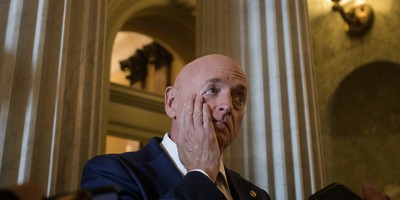When, oh, when is the Obama administration going to recognize the rebels in Benghazi as that country's legitimate government?
Those ill-equipped, ill-organized freedom fighters remain the world's best hope of dislodging Libya's still dangerous dictator in Tripoli. Just as our Afghan allies proved capable of driving the Taliban from Kabul with a little help, and maybe more than a little, from an America striking back at al-Qaida after September 11th.
There was nothing uncertain about American strategy or support then. The brunt of the fighting fell on the Afghans, but there was no question about whose side we were on. Just as there was no question that our air power, our supplies and our Special Forces were available -- and being used.
If this administration would recognize our tacit allies in Libya, there would be no need for all the presidential pretense about how the United States is not really seeking Moammar Gadhafi's overthrow even as it seeks it. Hopes for a free Libya would not have to depend on the usual empty UN resolutions and paper sanctions -- the kind that proved so ineffective for years against Saddam Hussein.
A few days ago, London played host to the most impressive array of distinguished foreign ministers and such since the League of Nations gathered in Geneva to hear Haile Selassie of ravaged Ethiopia plead for a little help against aggression in 1936. In vain. All the eloquent statements didn't help much. Those in London in 2011 will prove equally futile unless the world acts, not just talks.
In the latest tilt of the seesaw fighting in Libya, the dictator's mercenaries now have regained the initiative. This despite our president's proud claim in his address to the nation that our allies were advancing. For the moment they're retreating. Even being routed.
Rommel vs. Montgomery is being replayed across the Libyan sands, and this bloody back-and-forth will go on until the country that used to be called the Leader of the Free World acts like it. Openly, decisively, without making apologies for taking the side of freedom in this struggle. Oh, where is a Churchill when you need him?
Recommended
Once a free Libya wins international recognition, there will be no more wispy legal, diplomatic and political questions about this country's sending aid, ammunition, military advisers or any other help the rebels needs to rid their country of its dictator and his regime. We could then do openly what surely we're doing secretly now. Let's hope we're doing it, anyway.
Yet our secretary of defense, who's developed a bad habit of talking too much of late, has assured the American public -- and our enemies -- that the president is opposed, in military terms, to putting "boots on the ground" in Libya. What's that mean, that our CIA operatives there are wearing dress shoes? That we're unwilling to fully commit to the cause we've embraced? Which in war is a sure recipe for defeat.
Unfortunately, this president has formally, specifically, and repeatedly rejected any interest in regime change in Libya -- even while pursuing it. He declines even to call this war a war. The very word is verboten in his official vocabulary, which must be cleansed of politically incorrect terms.
Instead, American public opinion is served a heaping helping of doublespeak. This country is involved not in a war but in Overseas Contingency Operations or only a Humanitarian Effort. Its commander-in-chief speaks of the American military as if it were the Red Cross. And he never lets simple candor interfere with his talking points.
Everybody in Washington has to know what's going on in Libya -- John McCain and Joe Lieberman over in the U.S. Senate clearly do -- but no one in the President's circle is allowed to say so, not clearly, not simply, not without qualification or reservation or little winks. And in war there is no substitute for candor. Any more than there is a substitute for a united, supportive, well-informed home front.
It was another president from Illinois, a Mr. Lincoln, who said that "with public sentiment, nothing can fail; without it, nothing can succeed." To mobilize that sentiment, a president must level with the American people. Foggy language will not do it.
But calling things by their right names seems foreign to our president's nature. He doesn't address issues so much as talk around them. Like a bureaucrat trying to obscure a problem rather than solve it. Clearly he's spent a lot of years in academia. It shows.
Instead of relying on his TelePrompTer, Barack Obama might do well to arrange for simultaneous translation of his remarks, like at the United Nations, into plain English. I'd like to shake the hand of any translator who could perform that feat. It would be a great service to the language, and therefore to clarity of thought, not to mention American foreign policy. Which grows more and more vague. Like the president's statements about this war -- yes, war. Right now, when he talks foreign policy, what's clearest is what he doesn't say. Which is a lot.
Yes, there are times when strategic ambiguity can be useful, even wise. A president named Eisenhower was a natural at it. But unintentional ambiguity isn't strategic, it's just sloppy. And it loses a president traction with public opinion. How support or object to his policy if no one, including the president, is able to articulate it clearly? Or even answer the simplest questions about it, like whether we're at war or not, or determined to oust a dictator or not.
It was a European dictator, and one who was no slouch at military matters at that, who may have offered the best advice in the matter:
If you go to take Vienna, said Napoleon Bonaparte, take Vienna. If this president is out to take Tripoli, then take Tripoli. Otherwise, he will leave friend and foe forever dangling, and a civil war without end.

























Join the conversation as a VIP Member